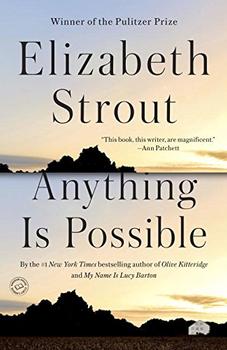Book Club Discussion Questions
In a book club? Subscribe to our Book Club Newsletter!
For supplemental discussion material see our Beyond the Book article, The Evolving Definition of PTSD and our BookBrowse Review of Anything Is Possible.
Please be aware that this discussion guide will contain spoilers!
1. Why do you think Elizabeth Strout chose to structure Anything Is Possible as a novel in the form of linked stories? How would your understanding of the book change if it had been written instead as a novel with a single narrative?
2. How does the town of Amgash feature in the text? How does it shape the lives of its residents? If Amgash had its own personality, how would you characterize it?
3. The past plays a strong role in these stories, and many of the characters find themselves struggling to reconcile with it. What are the various ways in which the past shapes them? How do they attempt to deal with their own pasts, and those of the people around them?
4. Strout deals with many different types of family relationships in the book—between parents and children, between spouses, among siblings. How are these different types of relationships treated? What are the differences and similarities in the ways the characters navigate these relationships? Which ones resonated most with you, and why?
5. An emotion that Strout addresses throughout Anything Is Possible is shame. What are the different roles shame plays for the various characters in these stories? How are they motivated, propelled, or hindered by shame? What effects does shame have on these characters' sense of self and their relationships with others?
6. Lucy Barton's legend looms large in Amgash. How do we perceive her through the eyes of the characters in each of these stories? How do these impressions of her differ? When Lucy makes an appearance in "Sister," did your perception of her change as Strout reveals the impact of Lucy's absence on her siblings?
7. Strout portrays wealth and/or poverty through the changing circumstances of several of her characters: Linda Peterson-Cornell; Abel Blaine; Abel's sister, Dottie; Tommy Barton and his sister Vicky. How do these characters react to their economic circumstances? How do these circumstances shape their relationships to those around them, and how they are perceived?
8. Many of the characters in these stories overcome adverse circumstances to experience moments of grace—Abel Blaine, Patty Nicely, and Angelina Mumford, for example. How do these moments of grace present themselves? Why do you think Strout decided to give her characters these opportunities for grace? How did this shape your understanding of these stories and characters?
9. Was there a character or story that affected you more than the others? Which, and why?
10. How did you interpret Strout's choice of
Anything Is Possible as a title, and how do you think this concept resonated with Abel Blaine in the last chapter of the book?
Unless otherwise stated, this discussion guide is reprinted with the permission of Random House.
Any page references refer to a USA edition of the book, usually the trade paperback version, and may vary in other editions.
